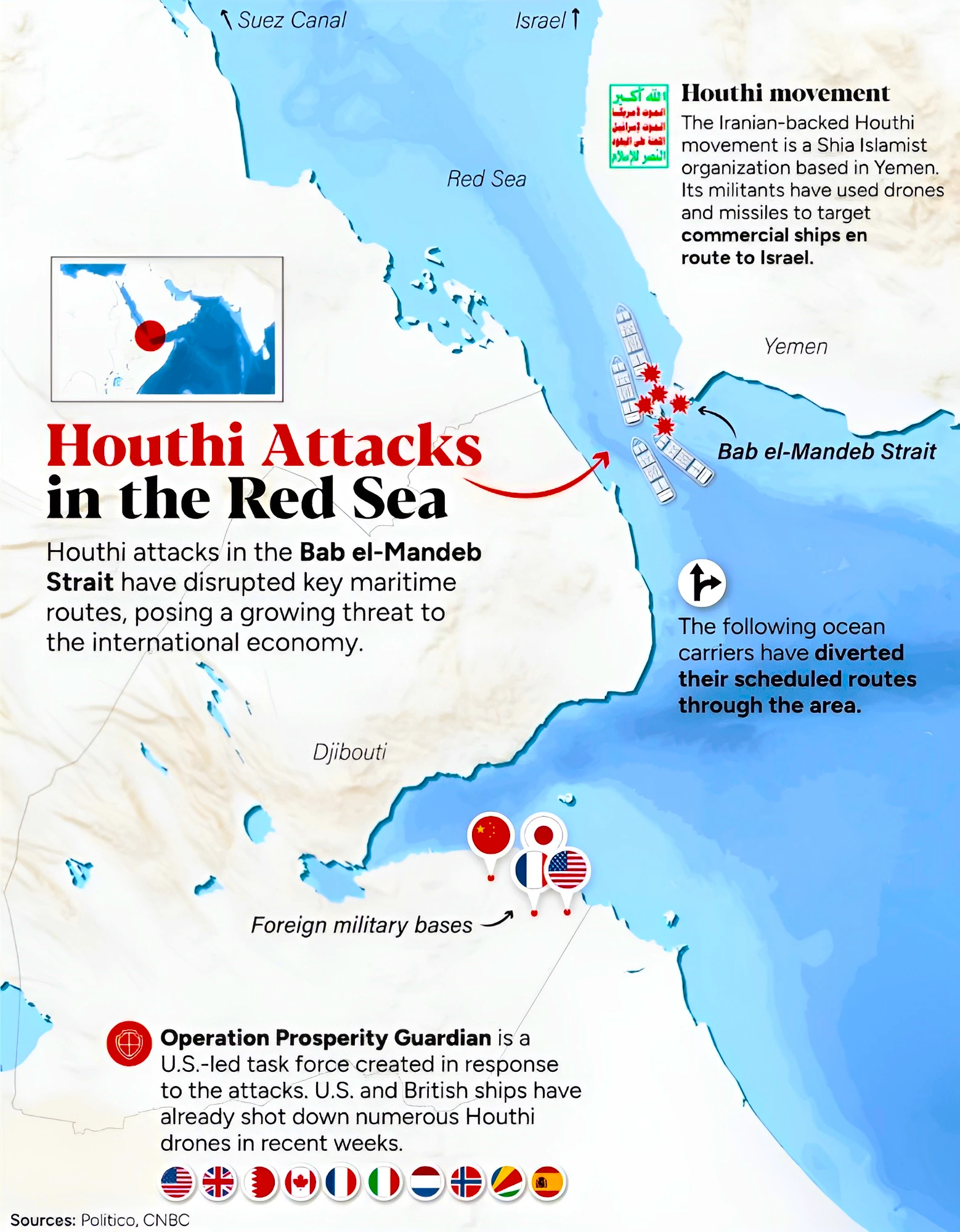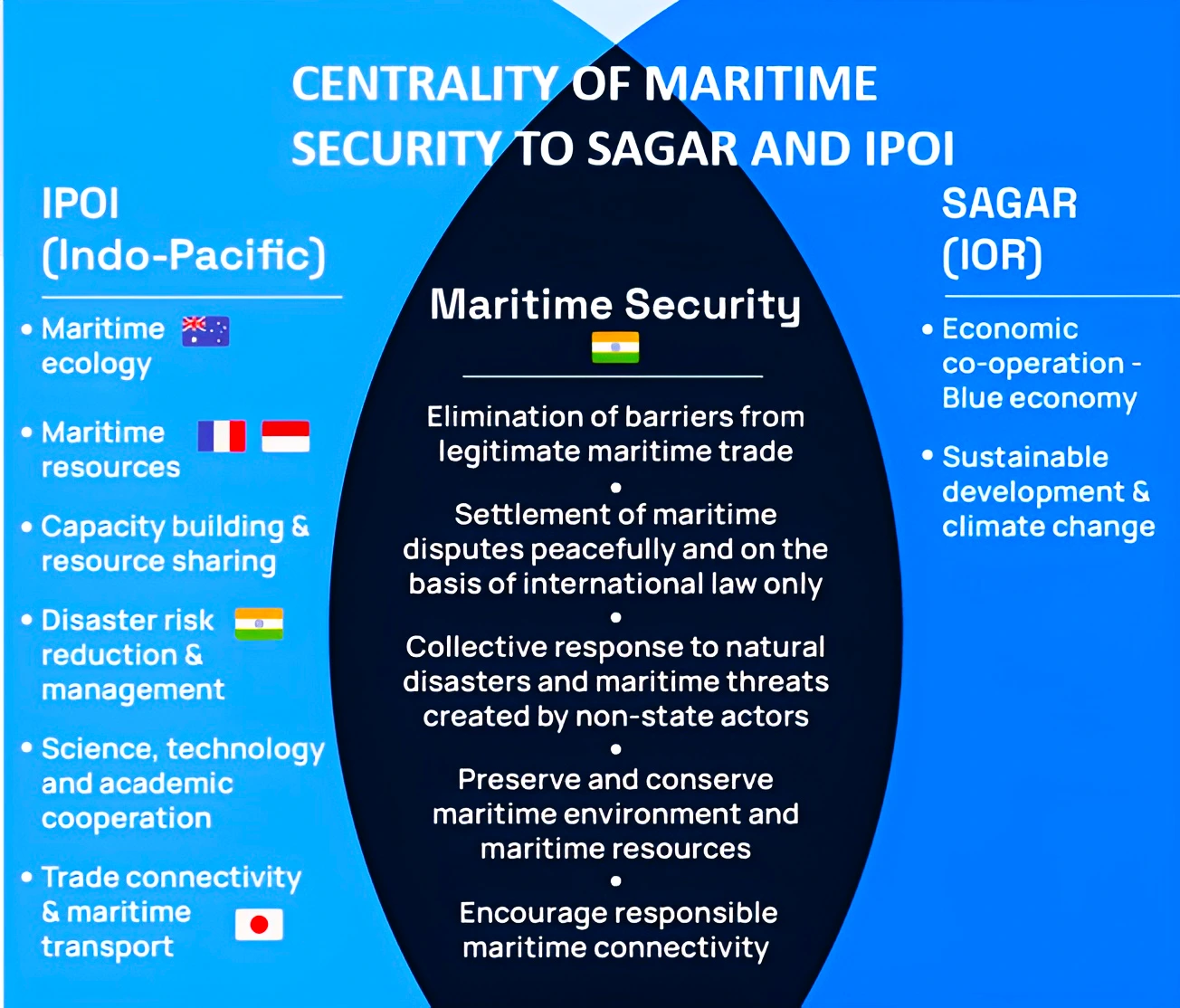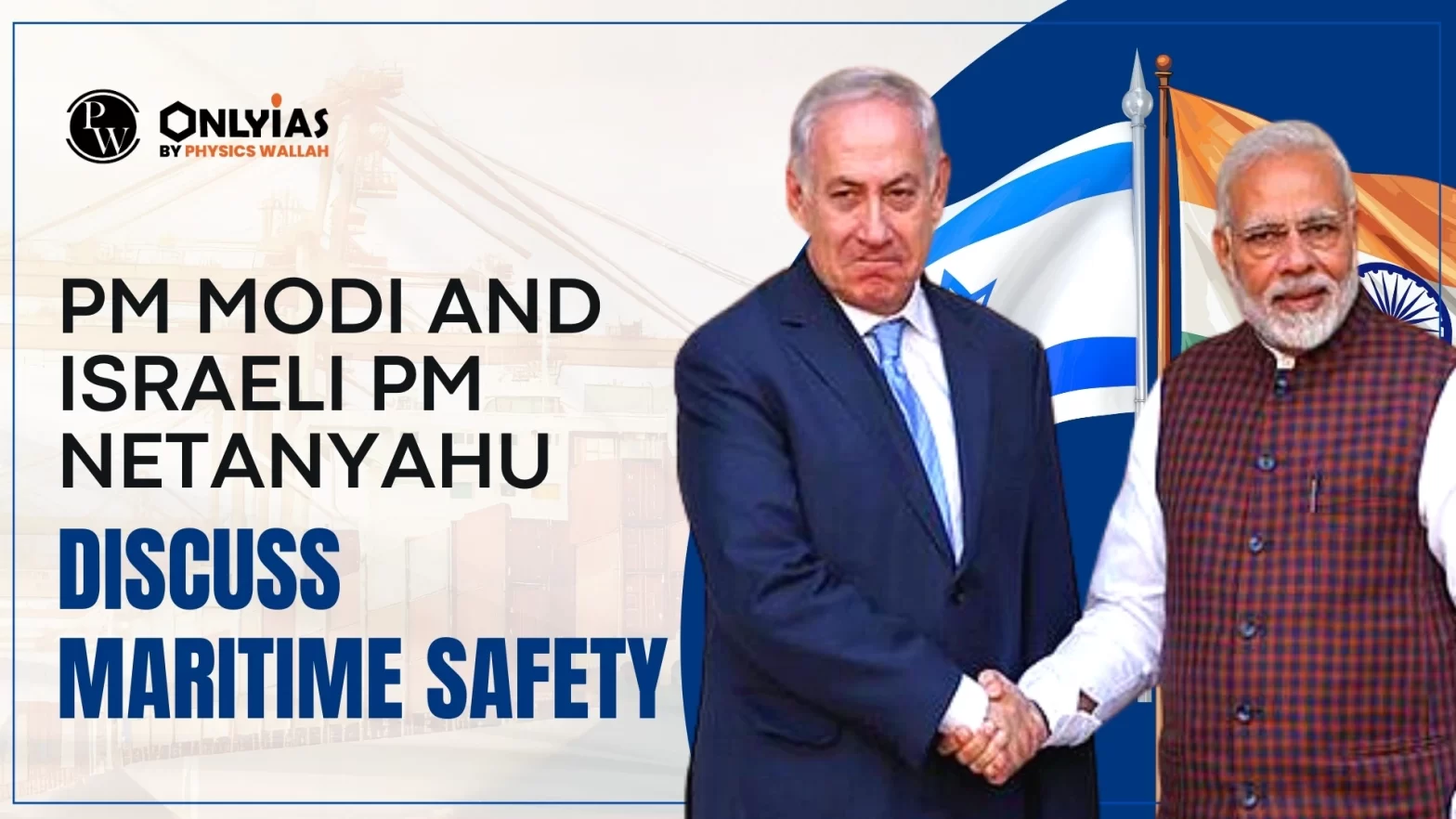Context: This article is based on the news “Modi and Netanyahu discuss Israel-Hamas conflict and maritime security” which was published in the Live Mint. Recently India and Israel discussed the escalating threats to maritime safety in the Red Sea region following the actions of Houthi militants of Yemen.
India-Israel express concern over Maritime Safety and amid Houthi threat
- Freedom of Navigation: Both sides discussed the freedom of navigation for ships going through the Bab-el-Mandeb strait, which faced a threat from Yemen’s Houthi militants.
- Retaliatory Measure against Gaza Attack: The Houthi militants recently launched a missile strike as a retaliatory measure against Israel for its attacks on Gaza.
- A tanker transporting a shipment of India-manufactured jet fuel evaded the strike.

- Operation Prosperity Guardian: It is a multinational security initiative launched by the US to counter the growing number of attacks against Israel-bound international traffic. Coalition includes the U.K., Bahrain, Canada, France, Italy, the Netherlands, Norway, Spain, and Seychelles, apart from the U.S.
- Impact on Maritime Trade: Attacks by Houthi militants on ships in the Red Sea are disrupting maritime trade as freight firms have to reroute around the Cape of Good Hope to avoid the Suez Canal.
About Bab-el-Mandeb strait
- The Bab-el-Mandeb strait is a crucial shipping route connecting the Mediterranean Sea and the Indian Ocean.
- It is an important link for India’s trade with the Middle East, Africa and Europe.
|
-
- This is leading to additional expenses and potential delays in shipments.
- Approximately 15% of global shipping traffic passes through the Suez Canal, the shortest shipping route connecting Europe and Asia.
- This has also created fears of rising prices of essential commodities like oil among global shipping companies.
Continue Reading: How Are Houthi Attacks On Ships In The Red Sea Affecting Global Economy?
About Maritime Safety & Security
- It classifies the issues in the maritime domain as comprising national security, marine environment, economic development, and human security.
- It also deals with regional seas, territorial waters, rivers and ports besides the world’s oceans.
Significance of Maritime Safety & Security for India
- Long Coastline: For India, maritime safety & security is an important aspect of national security as it has a coastline of over 7,000 km, exposing India’s vulnerability to maritime threats.
- 26/11 Mumbai Terrorist attack: On November 26, 2008, 10 Pakistani terrorists infiltrated south Mumbai via the sea.
- Critical Infrastructure: Critical infrastructure in the maritime domain facilitates the continuous delivery of basic services such as energy and communication, particularly the Internet.
- Protecting this infrastructure from sabotage or disruption is essential.
- Maritime Trade: India’s exports and imports have remained mostly across the shipping lanes of the Indian Ocean. Therefore, Securing Sea Lanes of Communication (SLOCs) has been an important issue for India in the 21st century.
- The Indian Maritime Sector contributes to 95% of India’s trade by volume and 70% by value.
- Geopolitical and Geostrategic Consideration: China has become an important military power in the Indian Ocean region (IOR).
- China is strengthening its presence in the Indian Ocean region with its String of Pearl theory.
- Ex- The Hambantota port in Sri Lanka and the Gwadar port in Pakistan.
- Exclusive Economic Zone (EEZ): India enjoys an EEZ of around 2.37 million sq. km, where India enjoys the exclusive legal right to utilise all living and non-living resources.
- India has special rights over the usage of exploration and marine resources in the region.
- Blue Crime: This includes piracy in regions such as the Gulf of Guinea and Strait of Malacca, the smuggling of illicit goods and people, such as narcotic trade and the smuggling of migrants in the Mediterranean region.
- As per the data compiled by the IFC-IOR, 161 piracy and armed robbery incidents took place in 2022.
- Unconventional Issues: Other concerns include robbery, illegal trafficking of goods and people, illegal fishing and pollution and environmental issues like fishing and marine pollution.
- The terrorist organization Al-Shabaab tied to Al-Qaeda and is based in Somalia has carried out numerous assaults on commercial ships and port facilities in the Indian Ocean region.
- Environmental Issues: Unrestricted fishing methods, shipping pollution, and waste disposal at sea have deteriorated marine ecosystems and reduced fisheries.
- The state of the marine environment not only jeopardizes fishermen’s means of subsistence but also has wider ramifications for global ocean sustainability and food security.
Maritime Safety & Security Mechanism of India
- Patrolling of IMBL: The Indian Navy patrols the International Maritime Boundary Line (IMBL).
- The Indian Coast Guard (ICG) is mandated to patrol and surveillance up to 200 nautical miles (i.e., EEZ).
- Patrolling in Shallow Coastal Areas: The State Coastal/Marine Police (SC/MP) performs boat patrolling in shallow coastal areas.
- The SCP has jurisdiction up to 12 nautical miles from the coast.
- The ICG and the IN have jurisdiction over the entire maritime zone (up to 200 nautical miles), including the territorial waters (with the SMP).
- Patrolling of Creek Areas: The Border Security Force (BSF) is deployed in the creek areas of Gujarat and Sundarbans in West Bengal.
Must Read: Safeguarding India’s Maritime Interests
Challenges related to Maritime Safety & Security for India
- Overlapping Jurisdictions: The patrolling and surveillance duties in coastal regions have been delegated to the State Coastal Police(SCP) in the nine coastal states/UTs. This has two main drawbacks.
- It leads to overlapping of duties of law and order (State List) with maritime border guarding (Union List).
- This also results in jurisdictional overlaps among the Indian Navy, Indian Coast Guard, and the SCP, creating a lack of unity of command at both the ministry and force levels.
Maritime Zones in India:
- According to the Maritime Zone Act, 1976, the maritime zones of India are divided into five Coast Guard regions, with the Indian Coast Guard (ICG) responsible for the enforcement of maritime zones.
|
- Coordination between Navy and ICG: The post of Chief of Defence Staff (CDS) with the rank of a four-star General was assigned the responsibility of leading the Department of Military Affairs (DMA), formed within the Ministry of Defence (MoD), and functioning as its Secretary.
- While the Army, Navy, and Air Force were placed under the DMA, the Indian Coast Guard (ICG) was placed under the Ministry of Defence.
- This prevents coordination between the Indian Navy (IN) and the ICG in both peacetime and wartime scenarios.
- Security of Maritime Borders is not ICG’s Primary Duty: ICG is mandated for ensuring the security of the maritime zones of India with a view to the protection of maritime and other national interests.
- It was not set up as an agency to guard India’s maritime borders but for policing and general superintendence of India’s maritime areas.
- Sea Lines of Communication (SLOCs): Threats to the SLOCs arise from challenges of piracy, drug trafficking, human smuggling, pollution, accidents, mines, closure of choke points, inter-state conflicts and territorial disputes in the region.
- Asia’s sea lanes remain vulnerable to various threats including China’s dominance in the region. Ex- Conflict between the United States and China over Taiwan, South China Sea disputes.
Information Fusion Centre-Indian Ocean Region (IFC-IOR)
- The IFC-IOR was set up in 2018 located within the premises of the Information Management and Analysis Centre (IMAC) in Gurugram.
- It currently has 12 ILOs posted there.
|
-
- China’s non-military activities in the eastern Indian Ocean are a source of concern for India.
- More than 80 percent of all seaborne trade in oil (equivalent to about one-fifth of global energy supply) passes through the IOR.
- Infrastructure Constraints: There are requests from several countries to post international liaison officers (ILO) at the Indian Navy’s Information Fusion Centre-Indian Ocean Region (IFC-IOR) but this has not been done due to infrastructure constraints.
India’s Initiatives for Maritime Safety & Security

- SAGAR Vision (Security and Growth for all in the Region): It aims at safeguarding maritime interests of its mainland and islands.
- Indo-Pacific Oceans’ Initiative (IPOI): IPOI seeks to ensure security and stability of the regional maritime domain.
- The Information Fusion Centre – Indian Ocean Region (IFC-IOR): It is a regional maritime security centre hosted by the Indian Navy.
- Indo-Pacific Partnership for Maritime Domain Awareness (IPMDA) initiative: IPMDA is a technology and training initiative to enhance maritime domain awareness in the Indo-Pacific region.
- Shared Awareness and Deconfliction (SHADE)” program: It has been set up to enhance information exchange to reach a high level of collaboration with other maritime forces.
- Colombo Security Conclave: It is a grouping that includes India, Sri Lanka, Mauritius and the Maldives for ensuring the security and stability of the Indian Ocean region.
Way Forward
- Five Principles Roadmap for Global Maritime Safety & Security: The Prime minister of India proposed five principles to ensure global maritime safety & security which include:
- Removing barriers from legitimate maritime trade
- Encouraging responsible maritime connectivity
- Settling maritime disputes through peaceful means and based on international law
International Mechanism Governing the Maritime Sector
- International Maritime Organization (IMO): It provides support, assistance and guidance to Member Governments on matters relating to maritime safety & security.
- International Convention for the Safety of Life at Sea (SOLAS): The SOLAS Convention is regarded as the most important of all international treaties concerning the safety and security of merchant ships.
- The United Nations Convention on the Law of the Sea: It was adopted in 1982. It lays down a comprehensive regime of law and order in the world’s oceans and seas establishing rules governing all uses of the oceans and their resources.
|
-
- Jointly facing natural disasters and maritime threats created by non-state actors
- Preserving the maritime environment and resources.
- Separate Maritime Guarding Force: Create a separate force by splitting the maritime border guarding function and the associated infrastructure, assets, and manpower of the ICG and placing it under the administrative control of the Ministry of Home Affairs.
- UN Structure for Maritime Safet & Security: A UN body along the lines of the UN Security Council needs to be created to regulate issues related to maritime safety & security.
- Issue Specific Grouping: A body including issue-specific subgroups (e.g. illegal fishing, piracy, smuggling) as well as regional ones (Western Indian Ocean, Strait of Hormuz, Gulf of Guinea) and can help in better reforming the current coordination issues of the maritime sector in a more sustained manner.
- Innovative Techniques for Maritime Safety Security: Improvements in satellite and unmanned aerial vehicle (UAV) technology could aid in enhancing the monitoring and surveillance of the region.
- Development of New Maritime policing techniques: Using floating police stations and closer collaboration with coastal communities.
Conclusion:
Addressing escalating threats to maritime safety is crucial for India and Israel, necessitating collaborative efforts, regional partnerships, and international mechanisms to ensure the security and stability of vital sea routes.
![]() 20 Dec 2023
20 Dec 2023


